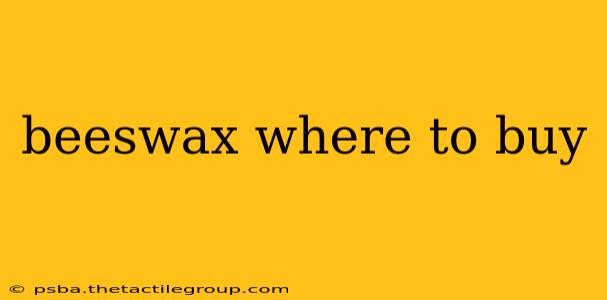Beeswax, a natural product secreted by honeybees, has captivated humans for centuries with its versatility and unique properties. From candles and cosmetics to furniture polish and food wraps, its applications are diverse and seemingly endless. But where can you find this golden treasure, and what should you look for when purchasing it? This guide will illuminate your path to sourcing high-quality beeswax.
Locating Your Perfect Beeswax Source
Finding beeswax isn't always as straightforward as a quick online search. The quality varies considerably, so understanding where to look and what questions to ask is key. Here are several avenues to explore:
1. Local Beekeepers: The Best Choice for Quality and Sustainability
Directly supporting local beekeepers is arguably the best way to source high-quality beeswax. These individuals often sell their beeswax in raw or refined forms, sometimes at farmers' markets or directly from their apiaries. The benefits of buying from a beekeeper are manifold:
- Transparency: You can often witness firsthand the beekeeping practices, ensuring ethical and sustainable sourcing.
- Superior Quality: Beekeepers typically offer unadulterated beeswax, free from additives or contaminants.
- Community Support: You directly support a local business and contribute to the preservation of honeybee populations.
- Variety: You might find different types of beeswax, depending on the bee breed and floral sources.
2. Online Retailers: Convenience with a Cautious Approach
Online marketplaces offer convenience, but careful selection is crucial. Look for reputable sellers with detailed product descriptions, including information about the beeswax's origin and processing methods. Be wary of extremely low prices, which might indicate lower-quality or adulterated beeswax. Check customer reviews to gauge the seller's reliability and the quality of their products.
3. Craft Stores and Health Food Shops: A Convenient but Potentially Costlier Option
Many craft stores and health food stores carry beeswax, often in smaller quantities. While convenient, these options are usually more expensive than buying directly from a beekeeper or through bulk online retailers. However, they offer a reliable source for smaller projects and provide the opportunity to examine the product in person.
4. Specialty Candle and Soap Making Suppliers: For Specific Needs
If you are using beeswax for candle or soap making, consider purchasing from specialty suppliers. These businesses often offer a wider variety of beeswax types, including different colors and purities, tailored to specific crafting needs.
What to Look For When Buying Beeswax
Irrespective of where you purchase your beeswax, careful observation is key to ensuring you get the best possible product. Pay attention to these crucial factors:
- Color: Pure beeswax ranges in color from pale yellow to deep amber, depending on the floral sources the bees utilized. Unnatural colors may indicate adulteration.
- Scent: Authentic beeswax possesses a subtle, honey-like aroma. Strong or unusual scents are a red flag.
- Texture: High-quality beeswax should be firm but pliable. A brittle or excessively soft texture might signal impurities or improper storage.
- Certification: Look for certifications or labels that guarantee the beeswax's origin, purity, and sustainable harvesting practices.
Conclusion: Making Informed Choices
Choosing where to buy beeswax involves balancing convenience, cost, and quality. By prioritizing local beekeepers and carefully examining the product's characteristics, you can ensure that you're using a natural, ethically sourced, and high-quality ingredient in your projects. Remember, a little research goes a long way in supporting sustainable beekeeping practices and obtaining the best beeswax for your needs.

